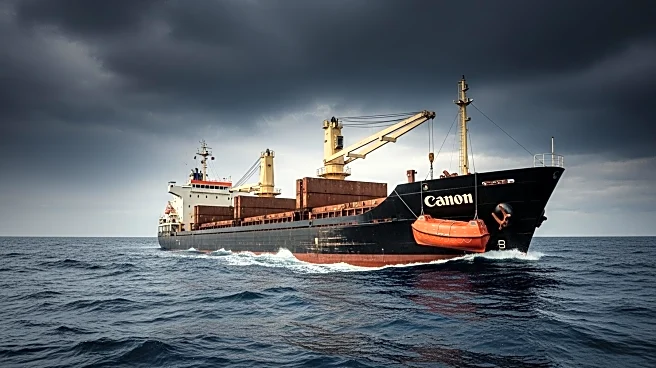What's Happening?
The Dutch cargo ship Minervagracht was attacked in the Gulf of Aden on September 29, 2025, by an explosive device, resulting in two crew members being injured and the vessel catching fire. The attack occurred while the ship was in international waters, approximately 128 nautical miles southeast of Aden, Yemen. The ship's operator, Spliethoff, reported substantial damage, and a helicopter evacuated the 19 crew members. The attack is suspected to be carried out by Yemen's Iran-aligned Houthis, who have previously targeted vessels in the Red Sea as part of their campaign in solidarity with Palestinians in Gaza.
Why It's Important?
The attack on the Minervagracht highlights the ongoing threat to international shipping routes posed by Houthi rebels. The Gulf of Aden and the Red Sea are critical for global trade, with disruptions potentially affecting supply chains and increasing costs for shipping companies. The incident also underscores the geopolitical tensions in the Middle East, as the Houthis align their actions with the conflict in Gaza. This could lead to increased international attention and intervention, impacting regional stability and security.
What's Next?
In response to the attack, international naval forces may increase their presence in the region to protect commercial vessels. Shipping companies might reassess their routes and security measures to mitigate risks. The situation could prompt diplomatic efforts to address the conflict in Yemen and broader Middle East tensions. The Houthis' pattern of targeting ships may lead to heightened security measures and potential retaliatory actions from affected nations.
Beyond the Headlines
The incident raises ethical and legal questions about the protection of civilian maritime operations in conflict zones. It highlights the challenges of enforcing international maritime law in regions with ongoing hostilities. Discussions may arise regarding the role of international organizations in safeguarding shipping lanes and the responsibilities of nations to prevent such attacks. Long-term, the instability in the region may influence global trade patterns and the strategic importance of alternative routes.









